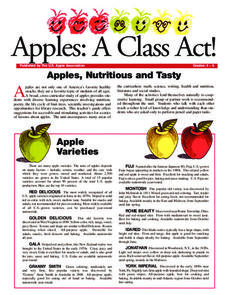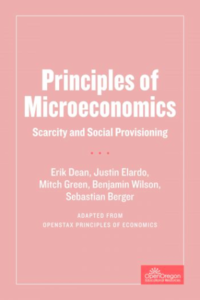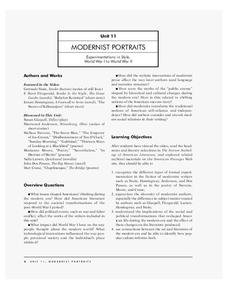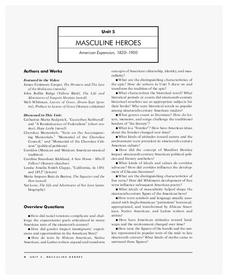Benjamin Franklin Tercentenary
Franklin’s Fair Hand American Journalism
Scholars know him for his role in the American Revolution, but Ben Franklin was also a journalist and printer. Learners investigate his standards for what was fit to print using primary sources—including writings where Franklin explains...
Los Angeles Unified School District
Why Is the Declaration of Independence Important?
Fair or unfair? To begin a study of the American Revolution, class members review the treatment of the people of the American Colonies by the King of England and decide which were fair and which were unfair. Class members then annotate a...
Google
The White House
Taking a guided tour through the White House would require extensive travel costs and an armed security escort—but a virtual tour only requires an Internet connection! A few clicks bring users through the historical corridors and rooms...
Council for Economic Education
Satisfaction Please! (Part 3)
Understanding the US government's role proves very important in the American economy, especially for consumers. Scholars learn about how varying government agencies help them when facing an issue. The third and final resource in the...
Council for Economic Education
Satisfaction Please! (Part 2)
Simply understanding consumer rights may not help people solve their problems. Understanding who to turn to becomes key in many different scenarios. Teach the value of various organizations that fight for consumer rights through...
Echoes & Reflections
Timeline of the Holocaust
An interactive timeline uses images, videos, primary source documents, and links to informational text to chronicle the history of the Holocaust from 1933-1945.
US Apple Association
Apples: A Class Act! (Grades 4–6)
Middle schoolers have a bushel of fun as they engage in activities and research core facts about apples. Packed with suggestions for in-class activities and out-of-class research, the colorful 6-page packet is sure to satisfy hungry...
A&E Television
The World Wars
Contemporaneously known as The Great War, World War I had never seen its match on the global stage—until World War II. An engaging set of resources designed to extend a viewing of the History Channel's The World Wars features discussion...
Open Oregon Educational Resources
Principles of Microeconomics: Scarcity and Social Provisioning
There’s no such thing as a free economics course, but here's a resource that is as close as you can get. Drawing on the expertise of a textbook, augmented by input from higher education economics instructors, a helpful eBook presents a...
PBS
Martin Luther King Jr.: Civil Rights Leader
Expand class members' appreciation of the work of Dr. Martin Luther King, Jr. A powerful resource examines King's speeches, writings, and actions that reveal his deep commitment to a nonviolent approach to Civil Rights. Learners watch a...
PBS
Malcolm X: Minister and Civil Rights Activist
Any study of the leaders of the Civil Rights Movement would be incomplete without an examination of the life of Malcolm X. Class members view a short biographical video and analyze primary source documents to gain an understanding of the...
PBS
Muhammad Ali: Boxer and Civil Rights Activist
Many young people today know Muhammad Ali as the aging boxer who lit the torch at the 1996 Olympics. Introduce young historians to Ali the boxer, the Civil Rights activist, the war protestor, and the humanitarian with a powerful lesson...
Stanford University
Observing Human Rights Day
How much intervention is appropriate for America to take in cases of human rights violations? Class members ponder a question that has lingered since the birth of America with a series of primary sources that reflect the degree to which...
US Institute of Peace
Simulation on Northern Ireland: One Step at a Time - The Derry March and Prospects for Peace
Where does tradition fit in a divided community with violence on both sides? Scholars learn about the marches in Northern Ireland and the many issues surrounding them. They take on roles in the community and try to convince others of...
Annenberg Foundation
The Search for Identity
Discover how writers express identity in their writing. Learners explore how issues of identity surface in the literature of minority writers. Scholars watch a video, read and discuss biographies, conduct research, engage in creative...
Annenberg Foundation
Poetry of Liberation
How do writers use words to protest injustice, challenge the status quo, and shape their own identities? Individuals watch and discuss a video, read author biographies, write poetry and journals, develop a slideshow, and complete a...
Annenberg Foundation
Becoming Visible
The television and interstate highways both came of age in 1950s America. Scholars use film, text, and discussion to explore how these and other cultural icons shaped the literature of the time. Pupils also create a family history...
Annenberg Foundation
Migrant Struggle
The American Dream is a goal that many pursue, but is it truly attainable for all people? An in-depth lesson explores the plight of migrants in twentieth-century America. The resource includes a video and author biographies and...
Annenberg Foundation
Modernist Portraits
How did literature reflect people's attitudes in post-World War I America? A lesson explores the topic using a variety of activities. Individuals watch and respond to a video; read author biographies and engage in discussion; write...
Annenberg Foundation
Rhythms in Poetry
Rhyme, rhythm, free verse, imagery: Do these words describe poetry, or jazz music? The answer is both! A resource explores these similarities as scholars watch a video, engage in discussion, read author biographies, write poetry and...
Annenberg Foundation
Social Realism
Many American writers in the late nineteenth century wanted their writing to reflect real life. Individuals watch and discuss a video, read and explore author biographies, write a journal entry and a poem, and complete a multimedia...
Annenberg Foundation
Slavery and Freedom
How do nineteenth-century texts by African American and Native American writers contribute to the country's ideals of freedom and individuality? Learners explore the topic by watching and discussing a video, reading biographies, writing...
Annenberg Foundation
Masculine Heroes
What were the driving forces behind American expansion in the nineteenth century, and what were its effects? Scholars watch a video, read biographies, engage in discussion, write journals and poetry, draw, and create a multimedia...
Annenberg Foundation
Spirit of Nationalism
What were the virtues and values that helped form America? Pupils watch and discuss a video, read biographies of early Americans, chart the differences between early American religious movements, write journals and letters, draw, and...

























